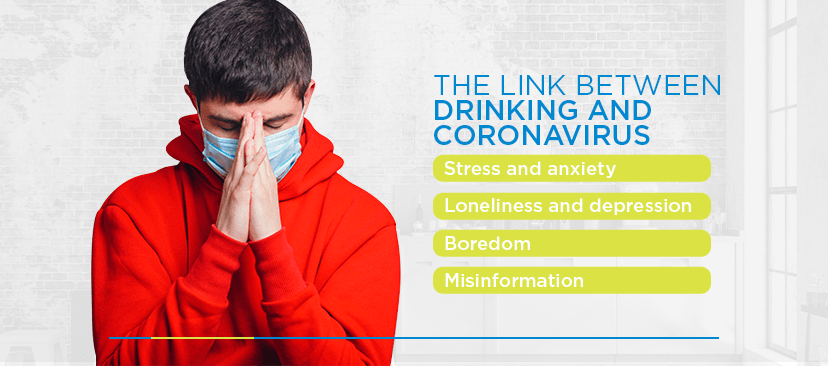- Apr 21
- AddictionAlcohol Addiction Treatment
If you or someone you know has been drinking more during the global pandemic, you’re not alone. The COVID-19 crisis has created challenges for many people, which has caused some to turn to alcohol as a way of coping.
- Increased Alcohol Consumption During the Pandemic
- The Link Between Drinking and Coronavirus
- Does Drinking Through a Crisis Actually Help?
- The Dangers of Alcohol Overuse
- Alcohol Addiction Treatment From Gateway Foundation
Increased Alcohol Consumption During the Pandemic
There are several indicators that alcohol consumption has been on the rise since the start of the pandemic. One indicator is alcohol sales. Outside of bars and restaurants, alcohol sales have risen by about 24% during the pandemic. Sales of spirits with a more concentrated alcohol content rose even more, by about 27%. While liquor stores have largely stayed open, it’s notable that there has been a dramatic rise in online alcohol sales.
Another indicator is people’s self-reporting of their drinking habits. One study looked at a 30-day period in 2019 and another one a year later. Participants reported on the number of days they consumed alcohol over those periods. In 2019, the average response was 5.48 days, and in 2020, this number rose overall by 14%. The percentage was higher for women at 17%.
This may not seem like a significant increase, but the study also found that, among women, there was a significant increase in episodes of heavy drinking, defined for women as having at least four drinks within a couple of hours. Women also reported a 41% increase in heavy drinking from the previous year’s baseline.
The Link Between Drinking and Coronavirus
These statistics make us question what link exists between drinking alcohol and the coronavirus pandemic. There are many reasons why some people have consumed more alcohol during this time than they did in previous years. The COVID-19 pandemic has given rise to issues and exasperated existing problems for many that can motivate them to drink, including:
- Stress and anxiety: The pandemic has been a source of stress for many. Maybe you’re worried about your health or the health of loved ones. Perhaps you’re anxious about your finances and how you’re going to make ends meet. Or maybe you’re dealing with difficult changes in family dynamics. For many people, the pandemic has brought these stressors and more. Anxiety and stress can lead some people to look to alcohol as a coping mechanism.
- Loneliness and depression: Other problems that motivate some people to drink include depression and loneliness — problems the pandemic has intensified significantly for many people. Stay-at-home orders have caused people to retreat from public life, and many people have also been isolated from family members and friends due to health concerns. Isolation can cause people to experience more severe depression and feelings of loneliness, which can lead them to alcohol.
- Boredom: Another aspect of staying home and being unable to enjoy activities like going to sporting events, the movies or out to dinner with friends is that you may experience boredom. The monotony of spending each day at home can lead some to turn to drinking as a way to add fun to their day or simply escape. Browse through social media, and you’re likely to see some people joking about drinking during quarantine for these reasons. Some drinks are even being labeled as “quarantinis.”
- Misinformation: Another issue that has caused some people to begin drinking or to drink more during this time is a misinformed understanding of the role of alcohol in combatting the coronavirus. The World Health Organization has attempted to address myths that consuming alcohol can somehow kill the coronavirus or enhance a person’s immunity. Because hand sanitizer contains alcohol, some people have assumed drinking alcohol will have a similar disinfecting effect internally, but this is false.
Does Drinking Through a Crisis Actually Help?
Many people have been using alcohol as a coping mechanism during this uniquely challenging time, but is drinking alcohol an effective coping mechanism? Alcohol is a depressant, which means it may make a person feel more relaxed temporarily. Alcohol can also provide a temporary boost in mood, providing an escape from negative feelings.
These effects draw many people to drink, but they are fleeting. When a person drinks in excess, the lasting effects are negative. At the very least, a person who drinks too much is likely to experience a hangover, which can make them feel worse. Drinking can also cause anxiety to worsen once the alcohol wears off. Alcohol-induced anxiety can last for hours up to a full day.
Overall, alcohol is a poor coping mechanism. While many people turn to alcohol during times of crisis, other coping mechanisms like counseling, journaling, exercise and phone calls with friends are healthier ways of reducing stress, anxiety, loneliness, depression and boredom.
The Dangers of Alcohol Overuse
If you or a loved one has been drinking excessively during the pandemic, you may consider it a normal means of coping. However, drinking too much alcohol comes with some significant dangers and should be taken seriously. Some of these dangers include an increased risk of:
- Health complications: Alcohol can increase a person’s chance of developing health problems like high blood pressure, heart disease, digestive problems, stroke, liver disease and various forms of cancer.
- Mental health problems: People can also experience mental health problems from alcohol use, such as depression and anxiety. These are problems they may be trying to escape through alcohol, but that actually become worse.
- Focus and memory problems:Alcohol use can have a negative effect on the brain, making it harder to focus and learn. This can manifest in poor school or work performance. It can also lead to dementia.
- Relational problems: Alcohol overuse can also lead to relationship problems with a partner, family members or friends. Relational problems may contribute to a harmful cycle in which a person turns to alcohol to escape these problems, thereby making the problems worse.
- Weakened immune system: An important consequence of alcohol to pay attention to during the pandemic is its effects on a person’s immune system. Long-term, chronic drinking can leave a person vulnerable to diseases like pneumonia, tuberculosis and COVID-19. Even a single instance of binge drinking can inhibit the body’s ability to ward off infections afterward.
- Addiction: Excessive alcohol use can also lead to an alcohol dependency. An alcohol addiction can make it difficult to quit drinking. With a treatment program, you can get the assistance you need to find healthy coping mechanisms and end an unhealthy relationship with alcohol.
Alcohol Addiction Treatment From Gateway Foundation
If you or a loved one is struggling with an alcohol addiction, you don’t have to suffer in silence or feel isolated. With professional help, you can overcome a substance use disorder and enjoy a new chapter of sobriety in your life.
At a Gateway Foundation treatment center, you can benefit from personalized alcohol addiction treatment. This includes medically supervised withdrawal and other evidence-based services that can help you recover safely. We provide ongoing support to our patients to help them along their entire recovery journey. If you’re ready to take this important step, contact us today to learn more.




